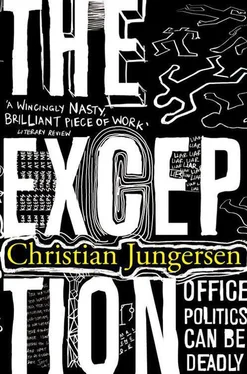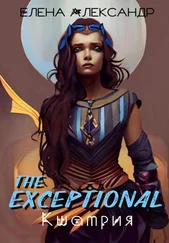Christian Jungersen - The Exception
Здесь есть возможность читать онлайн «Christian Jungersen - The Exception» весь текст электронной книги совершенно бесплатно (целиком полную версию без сокращений). В некоторых случаях можно слушать аудио, скачать через торрент в формате fb2 и присутствует краткое содержание. Год выпуска: 2010, Издательство: Orion Books, Жанр: Современная проза, Триллер, на английском языке. Описание произведения, (предисловие) а так же отзывы посетителей доступны на портале библиотеки ЛибКат.
- Название:The Exception
- Автор:
- Издательство:Orion Books
- Жанр:
- Год:2010
- ISBN:нет данных
- Рейтинг книги:3 / 5. Голосов: 1
-
Избранное:Добавить в избранное
- Отзывы:
-
Ваша оценка:
- 60
- 1
- 2
- 3
- 4
- 5
The Exception: краткое содержание, описание и аннотация
Предлагаем к чтению аннотацию, описание, краткое содержание или предисловие (зависит от того, что написал сам автор книги «The Exception»). Если вы не нашли необходимую информацию о книге — напишите в комментариях, мы постараемся отыскать её.
The Exception — читать онлайн бесплатно полную книгу (весь текст) целиком
Ниже представлен текст книги, разбитый по страницам. Система сохранения места последней прочитанной страницы, позволяет с удобством читать онлайн бесплатно книгу «The Exception», без необходимости каждый раз заново искать на чём Вы остановились. Поставьте закладку, и сможете в любой момент перейти на страницу, на которой закончили чтение.
Интервал:
Закладка:
You deserve to die, murmurs the voice inside her head. You’ve had twenty-eight years and you’ve done nothing with them.
Then the voice scolds her. You always think too much, always about yourself, always self-critical. Now you must act.
The tall Luo interrupts her thoughts. ‘You get out of the truck. Get the driver out. Then you take the wheel.’
Iben looks up at him. She does her best to make her every movement calm and controlled. ‘Get the driver out? Why?’
The tall Luo’s black face is contorted and inscrutable, like a corpse preserved in a bog. ‘You open the door. You carry the driver out. Then you go sit at the wheel.’
‘How … why carry him?’
‘He is dead.’
Iben senses that the man holding the panga at her throat feels something after all, behind his tense, closed features. It’s the broken rhythm of his breathing that gives him away, and the slight quivering of the blade against her skin.
‘They got to him. They cut his throat.’
That voice inside her head, her thoughts, reminds her of the dead bodies she writes about all the time. They deserved better than just twenty-eight years of life. Everyone does. Everyone deserves to find someone to love, a child to care for. And everyone includes me.
Iben lifts her hand slowly to point at the panga held against her neck. She wills her eyes to look pleading, but has no idea what kind of expression is creeping across her face. The thin cotton of her trousers is soaked with sweat where her body touches the white metal seat.
She realises that for a moment he feels hesitant about causing any more deaths. But this lasts only for a few seconds and then his face looks stony again.
His voice is deep. ‘You open the door. You carry my friend out.’
A quick glance at Roberto, Cathy and Mark convinces her that they too have worked out why, every now and then, the Nubians advance towards the truck and take aim with their guns. The trigger is any move by the hostage-taker on the passenger seat. He needs to shove the dead man out of the cab so he can drive the truck away. Every time he tries to do so the Nubians walk forward until he gives up. The man towering over Iben wants her to do something that none of the Luos dares to.
With the panga against her neck, Iben glances down at the ground, the dried crust of mud mixed with excrement and rubbish. Could she run the twenty metres between the truck and the line of Nubians to hide among them? If the hostage-takers shoot her dead, retribution will be immediate, so they have nothing to gain by killing her. But then, there’s no telling how rationally they think.
Without a word she stands, her eyes fixed on her comrades. Cathy begins to cry.
The Nubians cheer when they see Iben climbing down from the tailgate of the truck. Some of them step forward. One man must be confused, because he drops his large, black spear. But still no one dares to move into no-man’s-land. Instead most of them jostle to get back into their former positions behind the front line.
In the dust on the road that could have led to freedom, Iben looks around with fresh eyes. Can she avoid carrying out the order for just a little longer?
She wonders if she should shout ‘Here I come’, so that the hostage-taker in the cab doesn’t shoot her from sheer surprise when he sees her coming up from behind. On the other hand, it would give the Nubians more time to react, and they might well decide it’s worth shooting one hostage to stop the other three from being driven away.
She looks at the tall man on the tailgate and speaks to him quietly. ‘Tell him I’m coming. I mustn’t frighten him.’
The two Luos talk for a moment. None of the Nubians reacts. It seems that Iben was right in thinking that none of them understands Dhuluo.
The conflict between Nubians and Luos in the slum began when a Luo family refused to pay rent to a Nubian landlord. The landlord summoned a group of men from his tribe to meet him at the family’s shack. They wounded six tenants and killed two more. The group went on to challenge other tenants and attacked anyone who couldn’t pay. After slaughtering and dismembering another ten victims, well over a thousand men from each tribe clashed in the slums, stealing, raping and killing within each other’s territories. The police separated the two armies using teargas and rubber bullets, but were also accused of having taken the opportunity to rape and steal themselves.
The original reason for the refusal to pay rent in the slum was that Kenya’s President, Daniel arap Moi, had instructed the Luos that the rent demands were extortionate, since the state owned the land in the Kibera area, not the Nubians. It was the British colonial administration that had given the Nubians their management rights.
Iben hesitates. Will the boy on the back of the truck really shoot her if she doesn’t move the dead driver?
There’s a childishness about him that sets him apart from the other, harder-faced boys here, some of whom are just eight years old.
She tries to see what the two Nubians with machine guns are up to. One of them is out of sight behind the truck. The other is right there, wearing a white shirt, dark-green trousers and a baseball cap. She can’t make out his face, his willingness to kill, at this distance.
Smells. Dust. Sunlight.
The Nubian with the gun. The boy on the truck with the gun. The horde of onlookers. A fly, insisting on crawling into her ear.
On the tailgate the hostage-takers wave their weapons and shout.
At home in the quiet Copenhagen office, Iben’s place opposite Malene stands empty. She has a vision of the pale winter afternoon light falling over her bare desk with its waiting keyboard and curling Post-it notes. The fading light of the office seems to merge with the emptiness of her remembered life.
She grabs the door handle on the driver’s side and hears the crowd stir, then shout. Their language is just as incomprehensible to her as Dhuluo. The dead driver has been propped up against the door and when she opens it, the body falls out of the car sideways. Iben has to jump away to avoid being knocked over.
Until today, the only corpse she has ever seen was her father’s. It was nine years ago and the staff at Roskilde District Hospital had washed the body, closed its eyes and placed it in a small private room with net-curtained windows.
The dead driver is suspended, with his feet jammed under the pedals. His chest and head have swung out and down, hitting the ground just in front of Iben. A swarm of flies rises from his chest, where his blood-soaked shirt and trousers have already stiffened in the heat.
His face is twisted, his mouth open and his skin grey from blood loss.
Iben backs away into the cloud of dust. It is as if she were no longer herself.
She hasn’t thought about how the terrified man on the passenger seat might react. It turns out he has an automatic handgun.
Like everyone here he is used to the flies, but there are so many and they swarm round him for a different reason: he was sprayed with his friend’s blood inside the hot cab. His arms holding the gun are tired now after battling with the large, insistent insects.
He swings the gun round to point it at Iben. His voice is hoarse. ‘You shall … you shall sit.’
Iben feels nauseous. She stares at the ridges on the road. A few seconds — is it minutes? — pass and still she feels as if she were someone else.
She sits down on the driver’s seat. The man cannot risk keeping his gun trained on her all the time and has turned to face the wall of Nubians in front of them.
‘The police will come,’ Iben says. ‘The police will be here soon.’
‘You drive!’
But she does not start driving. She knows that turning the ignition key will mean the end for both of them.
Читать дальшеИнтервал:
Закладка:
Похожие книги на «The Exception»
Представляем Вашему вниманию похожие книги на «The Exception» списком для выбора. Мы отобрали схожую по названию и смыслу литературу в надежде предоставить читателям больше вариантов отыскать новые, интересные, ещё непрочитанные произведения.
Обсуждение, отзывы о книге «The Exception» и просто собственные мнения читателей. Оставьте ваши комментарии, напишите, что Вы думаете о произведении, его смысле или главных героях. Укажите что конкретно понравилось, а что нет, и почему Вы так считаете.












